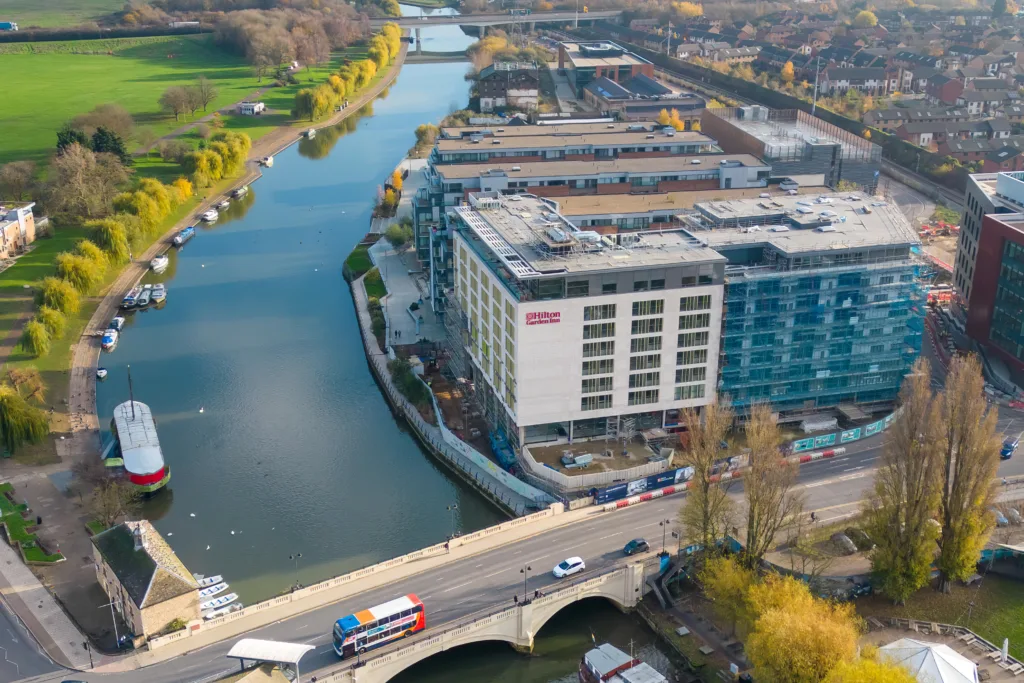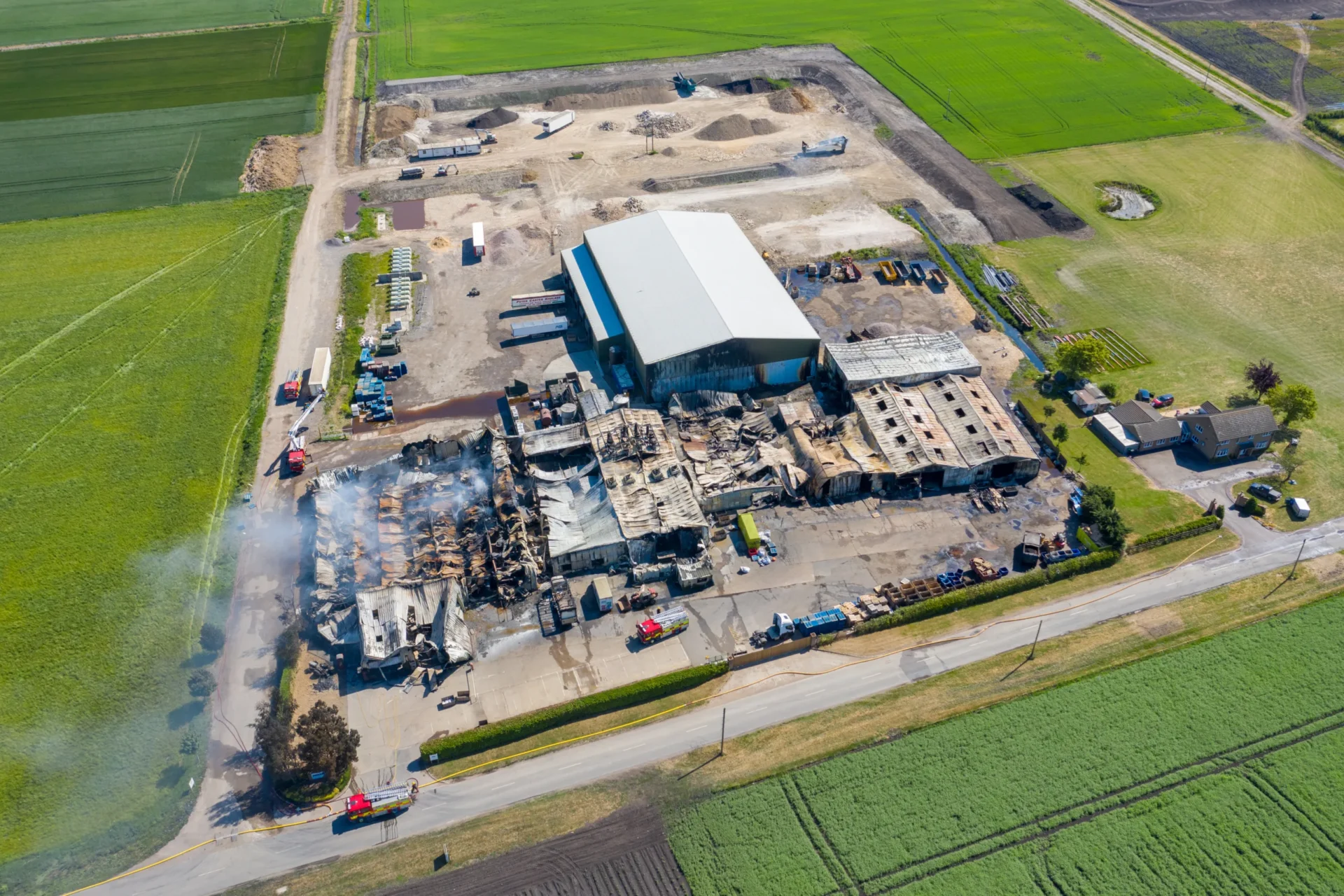Peterborough’s long-delayed Hilton Hotel project at Fletton Quays is finally set to be marketed for sale if councillors back a fresh plan to end years of uncertainty surrounding the half-built site.
At a Cabinet meeting today (October 2), Peterborough City Council (PCC) are expected to instruct administrators Teneo, who have overseen the development company since October 2023, to launch a formal disposal process and secure “best value” through an open market sale. The move marks a decisive shift away from earlier plans under which the council itself considered taking ownership of the asset.
The decision follows months of debate, aborted sales, rising costs, and political scrutiny. It also comes eight months after administrators warned in their February 2025 progress report that creditors faced losses running into tens of millions, with the city council unlikely to recoup its £17 million loan in full and most other creditors facing a total wipeout.
A Project That Stalled Before Completion
The Fletton Quays Hilton Hotel was once billed as a flagship project within Peterborough’s £120 million riverside regeneration programme. Planning approval was granted in 2017, and work began in 2020 on the 168-room scheme, which was intended to bring a global hotel brand to the city centre alongside new apartments, offices, and the government’s passport hub.
But construction was beset by problems. First, COVID-19 delayed progress. Then in June 2022, the contractor building the hotel went into liquidation, tearing up a fixed-price contract and leaving future costs to spiral. By mid-2023, work slowed to a halt as the developer failed to attract fresh investors. In October that year, PCC – as the senior secured lender – appointed Teneo as administrators.
Administrators’ Grim Assessment (February 2025)
In February 2025, Teneo’s joint administrators Gavin Park and Matthew Cowlishaw released their latest update. It painted a bleak picture:
- PCC’s £17 million loan: Secured against the site but unlikely to be repaid in full, even if the council exercised its right to acquire the property via a credit bid.
- Propiteer Capital’s £10 million: The second-ranking secured creditor was set to lose everything, with administrators warning there would be no funds left after PCC’s claim.
- Unsecured creditors: Trade contractors and suppliers had submitted £4 million of claims, but administrators were clear there was almost no prospect of a dividend.
- HMRC: The only creditor assured of repayment, with a £13,000 claim for Construction Industry Scheme deductions due to be settled in full.
- Failed sale: An apparent breakthrough in late 2024 fell apart when a potential buyer pulled out, prolonging the administration.
- Running costs: Security, insurance, and legal bills continued to eat into potential recoveries. PCC itself had advanced £450,000 to cover administration costs.
The administrators admitted they would need to seek a one-year extension beyond the original October 2025 deadline to wrap up the case, reflecting the continuing stalemate.
Council Considered Taking Control
Against this backdrop, PCC seriously explored taking over the hotel. In early 2025 it even set up a vehicle, Peterborough City Hotel Ltd, as a potential holding company.
Reports to Cabinet in March, July, and October 2024 had laid the groundwork for this option. Consultants 31Ten were commissioned to produce a detailed business case, while national procurement framework Scape appointed Willmott Dixon to prepare feasibility studies on completion costs.
But the October 2025 Cabinet paper confirms that detailed due diligence has pushed councillors away from direct intervention.
Costs and Risks Mount
The scale of the financial exposure is now clearer than ever:
- Loan write-offs: PCC has already absorbed £16.1 million in loan-related costs, including £14.9 million advanced and £1.2 million of interest foregone.
- Administration expenses: Nearly £1.3 million has been spent on administrators’ fees, security, and holding costs. A further £530,000 has gone on legal and project management advice.
- Building condition: Surveys revealed water ingress, pigeon infestation, and insurance issues. Immediate remedial works of £1.3 million would be needed just to stabilise the site.
- Completion costs: Willmott Dixon’s Scape analysis suggested millions more would be required to finish the hotel, with further risk allowances still unquantified.
- Ongoing liabilities: Any council-owned vehicle would face debt servicing, cash flow risks, specialist staff costs, and exposure to volatile hotel operating markets.
Crucially, consultants 31Ten concluded that disposal of the asset – rather than completion or council operation – offered the “optimum option” for value for money.
Cabinet’s Recommendation: Disposal Through Administrators
The October 2 Cabinet report, authored by Executive Director for Corporate Services Christine Marshall, states plainly that the risks of direct ownership are too high for the council’s fragile finances.
Instead, the recommendation is for Teneo to proceed with a structured sale process on behalf of creditors. The Cabinet paper stresses that administrators must follow both their statutory duty under the Insolvency Act and the council’s own best value obligations under the Local Government Act.

PHOTO: Terry Harris
Marketing will be led by CBRE, which has already reported “significant interest” in the site from prospective buyers. Unlike the limited soft market testing exercise in 2024, this will be a full disposal campaign, with timelines suggesting a deal could be reached within six to nine months.
Financial Accounting and Audit Considerations
PCC’s 2024/25 Statement of Accounts will formally recognise the likely loan loss, with only the outstanding principal retained as a “contingent asset” pending any recovery through the administrators. External advisers Arlingclose have been consulted to ensure compliance with accounting standards, and external auditors have been closely involved.
The Cabinet report makes clear that further borrowing to complete the hotel would have posed unacceptable risks, potentially undermining the council’s medium-term financial strategy at a time when resources are already stretched.
Legal and Governance Issues
The Cabinet report also highlighted complex legal advice obtained from Pinsent Masons regarding title, insurance, and the council’s rights as secured creditor. While PCC is entitled to direct administrators under the Insolvency Act, Teneo remain bound by their duties to all creditors.
By supporting an open-market sale, the council aims to avoid subsidy control risks and ensure transparency in disposal. The Cabinet also emphasised that it must demonstrate compliance with its best value duty in order to protect itself from legal or reputational challenge.
Impact on Creditors
For creditors, the decision offers mixed prospects.
For PCC, recovery is still expected to fall far short of the £17 million advanced, with a substantial financial loss now crystallised. Propiteer Capital and unsecured trade creditors face near-total losses, a position unchanged since February. HMRC, however, remains in line for full repayment.
For administrators, the sale offers the best chance of concluding the administration within the extended timeframe. If successful, proceeds will first repay PCC’s advances for administration costs, then contribute to reducing the council’s principal loan balance.
A Blow to Regeneration Ambitions
The collapse of the Hilton Hotel project has left a gaping hole in the city’s flagship regeneration scheme.
While other elements of Fletton Quays – including Sand Martin House, the government hub, apartments, and the multi-storey car park – have been delivered, the incomplete hotel stands as a stark reminder of risk.
For many local businesses and residents, the project has become synonymous with delay, overspend, and dashed expectations. A planned international hotel brand may never materialise, and the building’s eventual use could yet change depending on the buyer.
Looking Ahead
The October Cabinet decision does at least provide clarity after years of drift. Within six to nine months, administrators aim to secure a sale, allowing creditors to begin closure on their losses and enabling the site to be repurposed.
But the reputational scars remain. The Hilton collapse has raised serious questions about the wisdom of local authority lending to speculative developers and the adequacy of due diligence in regeneration projects.
For Peterborough, it is a cautionary tale: one of ambition colliding with market volatility, leaving taxpayers and investors to shoulder the fallout.



















